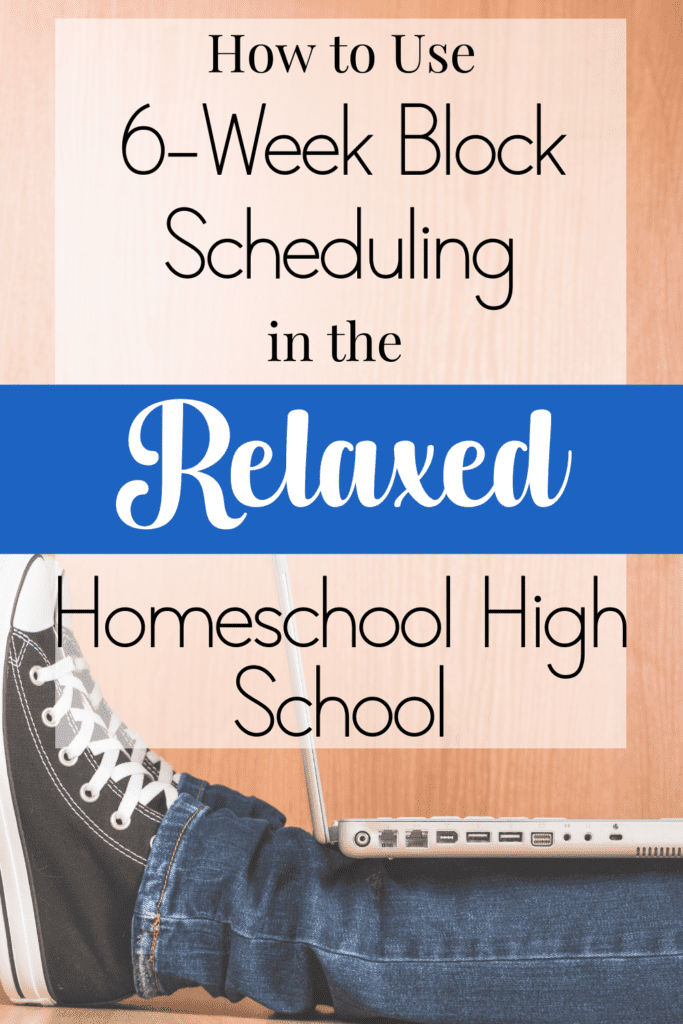Truth bomb: homeschooling high school is only as difficult as you chose to make it. We use a relaxed, eclectic style of homeschooling, so 6-week block scheduling works perfectly for us.
For 6 weeks we work on just a few subjects. Some 6-week blocks will be traditional school work with textbooks. Other 6-week blocks will be unit studies or delight directed learning.
The 6-week blocks allow us to quickly work through the subjects my children really do not enjoy. Then, spend 6 weeks studying whatever they want.
To complete a full school year of 180 days, we complete 6 of these 6-week blocks.

What 6-week block scheduling looks like in our homeschool
To give you an example of some of our 6-week blocks, I will explain my daughter’s 10th-grade homeschool schedule.
Example #1: 6-week block schedule
One 6-week block included Health and Physical Education, Algebra review, and Vocabulary. She also earned an elective Theater credit by participating in a community theater production.
For Health, we used the Alpha Omega Lifepac Health curriculum. For PE, we printed out a spreadsheet and she entered the date, type of activity, and time spent, so we had a record of her physical activity. (I required 60 hours total of physical activity for a half credit toward PE on her transcript.)
For Algebra review, she used No-Nonsense Algebra and worksheets I found for free online.
For Vocabulary, she used a Vocabulary Cartoons book.
By focusing on just 3 subjects, she was able to complete all the Health and Vocabulary curriculum in the first 6 weeks. She also finished a thorough Algebra review and felt more confident about starting Geometry.
Example #2: 6-week block schedule
Another 6-week block included a unit study on the Renaissance and Elizabethan England.
We put this unit study together ourselves using the library, the internet, notebooking pages, and short units purchased from the Teachers Pay Teachers website.
My daughter studied history, geography, Shakespeare, the Reformation, philosophy of humanism, Renaissance scientists and their discoveries and theories, as well as numerous individuals. Oh, and lots and lots of art. My daughter LOVES art… painting, sculpture, architecture, fashion. She even studied the music – styles, instruments, and composers of the Renaissance.
She earned credit for English, History, Science, and Humanities on her transcript.

Example #3: 6-week block schedule
Another 6-week block was a combination of standard textbook work and delight directed learning.
She worked on Biology and Geometry, but we also created our own study of music history.
The music history study was not as in-depth as a full-on unit study, but it was a subject she really wanted to focus on for a while.
At the same time, she was able to zoom through Biology and Geometry. Mind you, she didn’t complete those subjects in just 6 weeks, but she did make a LOT of progress. We had to pick those subjects up again in other 6-week blocks.
Benefits of 6-week block scheduling
1. For the student who has a difficult time juggling several subjects, 6-week block scheduling allows them to focus on only a few subjects at a time.
2. Allows time for delight directed learning, either through independent study or with an organized unit study.
3. Changing things up every 6 weeks keeps your homeschool exciting. My own kids are less likely to get bored.
4. It gives students the chance to move more quickly through the subjects they do not enjoy as much.
5. Using 6-week blocks creates short term goals. Every 6 weeks ends with a sense of accomplishment!
6. For the homeschooling parent, 6-week blocks are easy to plan and implement.
Also, be sure to check out these other posts in “Homeschooling”:
How to Homeschool for Free (or on the cheap!)
Why I Don’t Give My Homeschooled High Schoolers Tests (and what we do instead)

Hello! I’m wanting to homeschool and I REALLY love this method idea. Do you happen to have any advice for a 6th grader that’s only interest seems to be video games?
My son was only interested in video games for a long time. I asked him once what he wanted to study and he said “video games”. So, I went with it! He wrote a 15 (or so) page paper on the history of video games. He researched and wrote about the future of video games. Khan Academy has a free coding course to learn the basics of creating video games. If your son is interested in a particular game, say a Call of Duty game that is set in an historical time period, have him learn more about that era. Minecraft is a great game for exploring math… finding the perimeter or area of one of the buildings, etc. I say, go with it. Let his interest spark his learning!